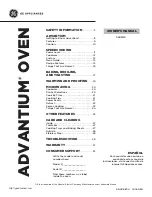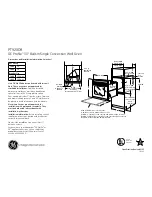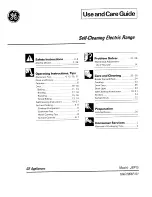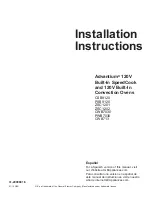
8
EN
Start-up and Use
CONVENTIONAL
programme
For this traditional cooking programme, it is best to cook
on one level only. Recommended for slow cooking or
when using a bain-marie. For a bain-marie, we
recommend placing the water directly in the enamel
dish.
ROAST
programme
The upper heating element, the circular heating element
and the fan are all working. The heat is radiated in a
single direction, in combination with the fan, in order to
spread the heat evenly throughout the oven. The risk of
burning food on the outside is greater and the heat
penetration is greater. The oven door stays closed
during cooking.
PROVING
programme
Both the circular heating element and the fan are used,
but only during the reheating phase. The temperature of
the oven is ideal for rising dough. During the rising
phase, do not open the oven door.
PASTRIES
programme
The parameters used make this cooking programme
ideal for all pastry recipes.
TARTS
programme
The parameters used make this cooking programme
ideal for all tart recipes.
DESSERTS
programme
This cooking programme is recommended for patisserie
(profiteroles and other choux pastry recipes, for
example, or Genoise cake), but not for BRIOCHES,
PASTRY or CAKES CONTAINING BAKING POWDER.
WHITE/BROWN MERINGUE
programme
The temperatures are preselected and cannot be
changed. The WHITE MERINGUE programme is ideal
for drying meringues. The BROWN MERINGUE
programme is unbeatable for cooking meringues.
DEFROSTING
programme
The fan at the bottom of the oven circulates the air at
room temperature around the food. This function can be
used to defrost any type of food but it is particularly
recommended for delicate foods that would be ruined by
exposure to heat, such as pavlovas, cream cakes,
custard deserts, cheesecakes or fruit flans.
LOW TEMPERATURE
programme
This type of cooking, that has been used for many years
by professional chefs, can be used to cook (meat, fish,
fruit, vegetables) at very low temperatures (85, 95 and
120 C) and obtain perfect results to delight even the
most demanding of chefs.
Main advantages:
Since the cooking temperatures are very low (in
theory, lower than evaporation point) the cooking
juices are not dispersed and the final dish is much
more succulent.
In meat, the muscle fibres shrink less compared to
traditional cooking.
The result: the meat is more tender and does not need
to rest after cooking. Meat should be browned before it
is put in the oven.
Low-temperature, vacuum cooking,
which has been used for thirty years by the best chefs,
has many qualities:
Gastronomical qualities: it brings out the full flavour
of the food, while ensuring that it remains succulent
and tender.
Hygiene: standards of hygiene are respected: this
type of cooking protects food against the harmful
effects of oxygen and prolongs the length of time
that cooked dishes may be kept in the fridge.
Organization: since foods can be kept for longer,
dishes may be prepared well in advance.
Healthy eating: this type of cooking requires less fat
and the dishes are therefore lighter and more easily
digested.
Economy: this mode considerably reduces the
weight loss of foods during cooking.
To use this technique, a vacuum machine and special
sachets are required.
Follow the manufacturer’s instructions carefully for
vacuum-packing food.
The vacuum technique can be used to preserve raw
foods (fruits, vegetables, etc.) and cooked foods
(traditional cooking).
PASTEURIZATION
programme
This type of cooking is suitable for fruit, vegetables, etc.
Small recipients can be cooked on 2 levels (enamel tray
on level 1 and grid on level 3). Leave the recipients to
cool inside the oven. Cook from cold.
Содержание SPY1S
Страница 1: ......
Страница 20: ...201511 Scholtès Built in Oven SPY1S ...






































